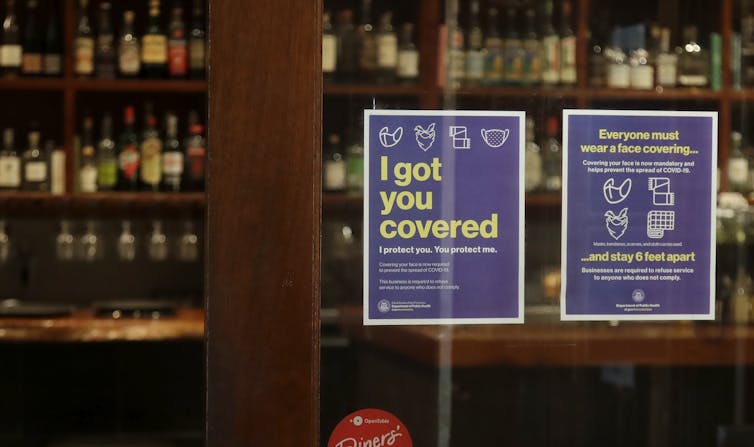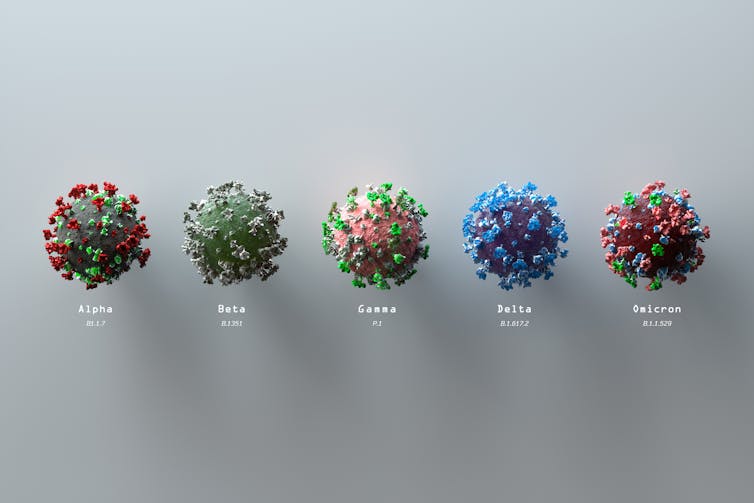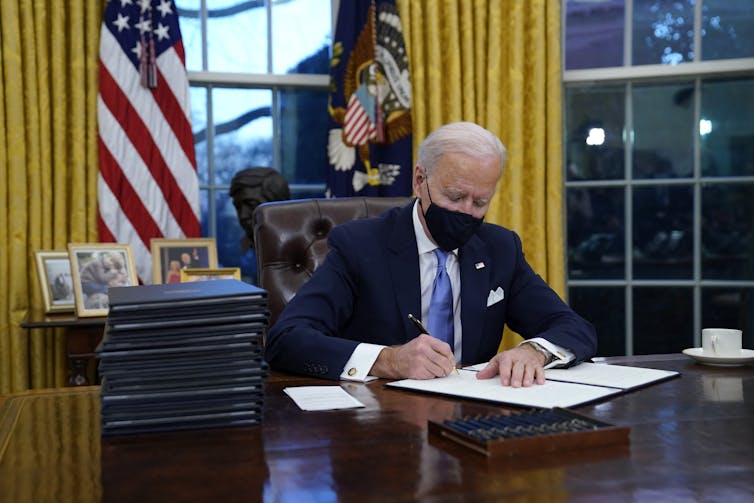Tomorrow’s COVID safety guidelines will be different from today’s – but that doesn’t mean yesterday’s were wrong

AP Photo/Jeff Chiu
Michael Williams, University of Virginia
No one gave a second thought to the safety of dining out before the pandemic. Fast-forward to today, and it’s normal to wonder whether there is a city, state or federal policy around whether you need a mask or proof of vaccination to eat in a restaurant. The public policies around dining and many other activities have changed multiple times over the course of the pandemic. These rules are also often different from place to place. For millions of parents like my wife and me, the guidelines regarding children can be especially frustrating, as they seem to change constantly.
I am the former director of the University of Virginia’s Center for Health Policy and a practicing surgeon. I have followed both the development and rapid implementation of public policy in response to COVID-19, and I, like many people, have struggled to stay up to date.
Typically, meaningful changes to federal health policy happen at a glacial pace. But the modern world has never faced a public health crisis that has changed as quickly as the pandemic. The constant back and forth of rules can be frustrating, but policy changes aren’t usually a sign of mistakes. Rather, they show that for the most part, policymakers are getting things right over and over again.

Andriy Onufriyenko/Moment via Getty Images
Rapid changes require rapid responses
The continued evolution of the coronavirus and resultant public policy changes don’t look like a normal public health crisis. It’s happening like a hurricane.
The danger of a hurricane depends heavily on the strength and path of the storm, and these things can and do change unexpectedly. Government officials use the best evidence available to give general information or orders to take certain precautions, shelter in place or evacuate an area, all within a very narrow window of time. Sometimes evacuation orders for a town or region will be issued, only to have a hurricane strike elsewhere.
This virus has similarly changed – and continues to change – very quickly. In a little over two years, researchers have found dozens of COVID-19 variants. Many of these have clinically important differences in their transmissibility, the severity of the illness they cause and the degree to which they are preventable and treatable with existing therapies.
When the coronavirus first emerged, health officials knew very little about it and did not have systems in place to track or predict its behavior; there was a hurricane approaching and the world had neither satellites nor weather models. But as epidemiologists and public health officials gained greater understanding of the virus, they quickly gained the ability to deploy effective countermeasures and adapt as the virus also changed.
University researchers and the pharmaceutical industry rapidly developed COVID-19 tests. Mask testing began at once. And as soon as scientists mapped the coronavirus’s genome, work began to quickly use existing mRNA vaccine technologies to develop a vaccine in record time.

AP Photo/Evan Vucci
Public health done fast
With science and situations on the ground evolving rapidly, policymakers had no choice but to be equally as nimble. This has manifested in two unique ways.
First is the use of executive power. Both Presidents Trump and Biden – as well as a host of governors from coast to coast – have leveraged executive orders to shorten the time between the development and implementation of policies. Executive orders are also much easier to roll back or reinstate as coronavirus cases ebb and flow over time, and states in particular have relied on the ability to do this.
Second is the fast-tracking of drug and vaccine approvals. The normal process by which the U.S. Food and Drug Administration approves new drugs is slow – usually around a 10-year process or so, depending on the treatment. Drug companies can use the FDA’s emergency use authorization process to speed this up slightly, but not by very much. To shorten this process even more, the FDA created a fast-track program specifically intended to accelerate the approval of treatments and vaccines for COVID-19. As a result, it took less than a year for vaccines to get emergency use authorization from the discovery of the coronavirus.
Just as a hurricane response needs to adapt to conditions on the ground and implement the best available information at a moment’s notice, so too has the pandemic response.

Fred Hsu via WikimediaCommons, CC BY-SA
Different places, different policies
Hurricanes are intensely local and relatively short-lived. The pandemic is like dozens of different hurricanes repeatedly hitting all over the U.S. simultaneously. This has created a complicated web of policy that can and should be different depending on where you are and what bodies govern there.
The U.S. Congress, state governors, city mayors, departments of health and even local school boards have each needed to develop and implement policies for their own hurricanes at their own levels of control.
Despite its complexity, this approach to public policy is another example of getting it right over and over. New York City public health officials must respond to the unique situation in New York at any given time. These actions may be very different from the issues confronted by the mayor of Barstow, California – a far smaller, far more rural city. Local conditions require local solutions, all of which can evolve over time. This is very different from most other public health problems in the U.S. During flu season, for example, the correct response tends to be relatively similar from place to place.
Getting it right over and over again
I and many others have been guilty on occasion of thinking of policymakers as backpedaling when guidance changes back and forth or being inconsistent when one state makes a certain decision while another does something else. But I’ve come to appreciate that that isn’t the correct framing.
As variants emerge, targeted policies to counteract the new reality follow in quick order. Reinstating mask requirements after they have been dropped or recommending additional vaccine doses between waves may seem like 180-degree course corrections. But in reality, these policy changes are the right reactions to the hurricane of COVID-19 that continues on its meandering path across the globe.
When the next change comes, I submit that you shouldn’t be frustrated or angry. Rather, we should all applaud the fact that researchers and public health experts are getting it right over and over again.
[Research into coronavirus and other news from science Subscribe to The Conversation’s new science newsletter.]
Michael Williams, Associate Professor of Surgery and Public Policy, University of Virginia
This article is republished from The Conversation under a Creative Commons license. Read the original article.
















